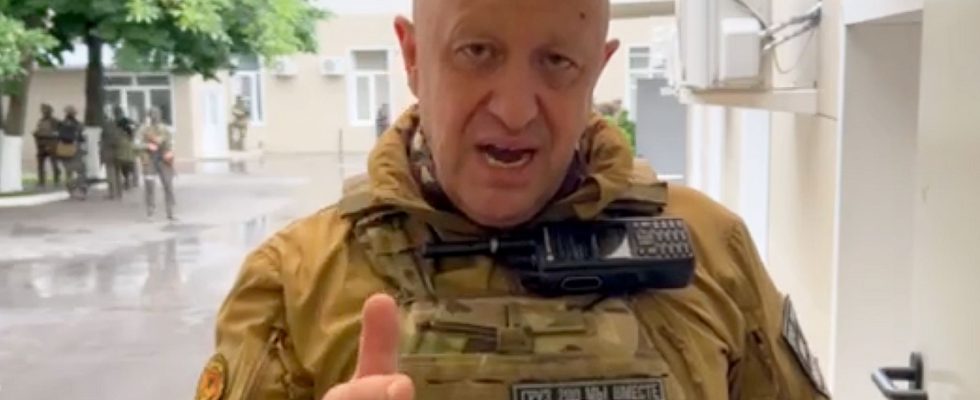Leaning over his shoulder, a balding man proudly presents Vladimir Putin with a dish, while the latter displays a skeptical pout. At the time of this shot in 2011, in a restaurant in Moscow, does the Kremlin chef already know that one day the trust he places in this chef, Evgueni Prigojine, will turn against him? The man, often seized by photographers wearing a sullen air, was once a small unknown restaurateur, before appearing in the Putin galaxy where he quickly enriched himself by winning public contracts. It is this money that he would then have used to found Wagner, a private army initially composed of hardened veterans of the Russian army and special services. Since then, Prigojine’s “small business” has prospered, to the point of becoming indispensable in many theaters of operations: in Ukraine, Syria or the Central African Republic.
Born in Saint Petersburg, like Vladimir Putin, Evgueni Prigojine is also a former sportsman, a cross-country skier. But when the young “Volodya” joins the Russian secret services, “Genia” ends up in prison for common law offenses. He will spend nine years in Soviet jails. He left in 1990, just as the Soviet Union was collapsing, and set up a successful business selling hot dogs. But Evgueni Prigojine will not stop there: he quickly goes upmarket to open a luxury restaurant which becomes one of the most popular in Saint Petersburg, where Vladimir Putin knows in parallel his own political ascent.
In the circle of those close to Putin, he is often despised, in particular by Defense Minister Sergei Shoigu. Neither of them has ever hidden their hatred of the other. When he became minister in 2012, one of Shoigu’s first actions was to strip Prigozhin of the lucrative contract between his catering company and the Russian Defense Ministry. The “cook of Putin” never digested the offense. With the war in Ukraine, Yevgueni Prigojine came out of the shadows to fully endorse his status as the centerpiece and rising star of the Putin system. Until this Friday, June 23, when he decided to challenge his former mentor, Vladimir Putin, mired in a conflict that never ends.
From the shadow to the light
The Russian president vigorously denounced this Saturday, June 24 the “treason” of Yevgueni Prigojine, “caused by excessive ambitions and personal interests”, pointing to the risk of “civil war”. The impetuous billionaire claimed to have seized “without a shot” the headquarters of the Russian army in Rostov, the nerve center of operations in Ukraine, after accusing the Russian army the day before of having bombed camps of his group. Claiming to have “25,000” fighters “ready to die”, the 62-year-old mercenary leader called on the Russian army and population to join him, while defending himself from any “military coup”. In response, the powerful Russian security services have opened an investigation against him for “calling for armed mutiny”, a serious accusation which could in theory send him behind bars for a long time. But nothing is certain when it comes to Evgueni Prigojine, a past master in the art of provocation and reversals. “Prigojine is a former prisoner, he has a very developed survival instinct. If he feels strong enough to ignore an order from Putin, it is because he has other high-placed support”, assured historian Françoise Thom at L’Express a few days ago.
His transition from shadow to light began in September, when the Russian army suffered setback after setback in Ukraine, a humiliation for the warmongers of which he is a part. He then comes out of the woodwork by admitting, for the first time, that he is indeed the founder in 2014 of the paramilitary group Wagner, active in Ukraine as in Syria, but also in Africa. And stands out as a leader. “These guys, heroes, defended the Syrian people, other peoples of Arab countries, the poor Africans and Latin Americans, they became a pillar of our homeland,” he claims.
In October, he pushes this logic of advertising even further, installing with great fanfare in a glass building in Saint Petersburg (north-west) the headquarters of the “private military company Wagner”. A master of provocation, he published a video in February showing him on board a war plane where he proposed to Ukrainian President Volodymyr Zelensky to decide the fate of Bakhmout during an aerial duel.
In May 2023, after months of hard and bloody fighting, Yevgeny Prigojine achieved consecration by claiming Wagner’s capture of Bakhmout (eastern Ukraine), celebrating a rare battlefield victory for Russian forces. But it was also during this battle that tensions with the general staff increased: Evgueni Prigojine accused him of depriving Wagner of ammunition and multiplied the videos in which he insulted the Russian commanders. Unthinkable for anyone else in Russia, in a context of total repression. But by calling for the uprising of the Russian army and population against the General Staff, Yevgueni Prigojine crossed the Rubicon. “The system is disintegrating. Prigojine feels that it is collapsing, there is no longer any need for respect for protocols, respect for the hierarchy”, this is what Abbas Gallyamov, ex-pen of Putin, confided to L’Express in an interview published on May 31
